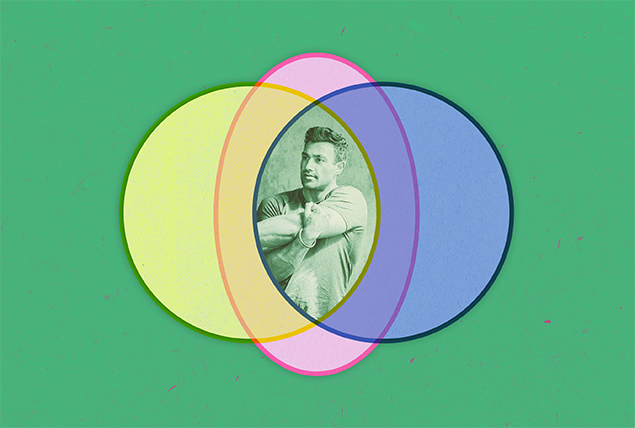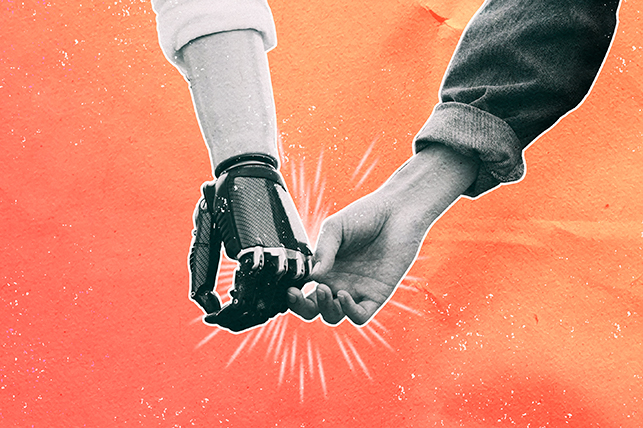What Is Ehlers-Danlos Syndrome and Its Connection to Sexual Health?

Ehlers-Danlos syndrome (EDS) is a genetic condition that can include chronic pain, fragile skin and joint hypermobility. It can make day-to-day tasks and activities more complicated—especially sex.
Given the condition's relative rarity, it's fair to ask, "What is Ehlers-Danlos syndrome and its connection to sexual health?"
What is Ehlers-Danlos syndrome?
EDS is actually a group of 13 related genetic disorders that affect the connective tissue, according to the Ehlers-Danlos Society. Those with a family history have an increased risk of having EDS, but it can occur by chance, according to the United Kingdom's NHS.
The most common types of Ehlers-Danlos syndrome are hypermobile EDS (hEDS), classical EDS and vascular EDS, according to the ILC Foundation. Most of the EDS types, such as kyphoscoliotic, are rare.
Although some symptoms are specific to particular types of EDS, they also share specific symptoms. The clinical manifestations of EDS, according to the National Library of Medicine, include the following:
- Skin hyper elasticity
- Hypermobility of joints, or greater than average movement
- Atrophic scarring (when the skin cannot repair and regenerate properly)
- Fragile blood vessels
Those with vascular EDS may possess certain physical characteristics, Mayo Clinic noted. These include:
- Thin lips
- Small chin
- Thin nose
- Large eyes
This genetic condition affects roughly 1 in every 20,000 babies, according to the New England Regional Genetics Network (NERGN).
There is no cure for Ehlers-Danlos. As a chronic condition, EDS is managed by treating an individual's symptoms.
How does Ehlers-Danlos impact your sexual health?
When it comes to sex, we all have different likes. What feels good for some may be uncomfortable for others. Various medical conditions can make these sexual differences even greater.
For people with EDS, sex may be painful.
Multiple studies suggest roughly 77 percent of women with EDS experience dyspareunia (pain with sexual intercourse). They might also struggle with other sexual complications, such as lower libido and sex-related anxiety. In addition, EDS patients seem to be more sensitive to hormonal fluctuations, which all women of reproductive age experience, and that can worsen their EDS symptoms, complicating sexual activity further.
Because EDS can often lead to hypermobility, pain and joint dislocation, sex can prove to be a little more complicated. EDS can greatly impact sexual health.
Chronic pain in the pelvis or vulva
Chronic pain is a common symptom of EDS. People with the condition are more susceptible to joint pain, especially when the body is under stress. So it makes sense that having sex might become painful.
"The moans and groans of ecstasy turned to moans and groans of discomfort and, at times, screams of horrific agony," Louise Boyle, a writer with EDS, wrote for The Mighty.
"Chronic pain in the pelvis is more likely to be reported by folks with hypermobility, with a range of four to seven times as often compared to their collagen-typical peers," said JJ Hurst, D.P.T., a physical therapist and an EDS specialist with The Embodied Physio in Durham, North Carolina. "This includes individuals across sexes and genders, folks who've delivered children and those who haven't."
Joint dislocation during sex
People with EDS may experience joint dislocation during sex.
"The louder I got, the harder he would go at it, thinking I was loving it," Boyle wrote. "I had absolutely no opportunity to let the poor guy know my hip had just popped out. After incidents like that, he became petrified that he would break me."
Another woman with EDS, Darcey Kelly, spoke to The Tab about her experience. She explained that she experienced more than one joint dislocation on a daily basis—and that they occurred frequently during sex. "It can have an awkward moment, say, if my hip pops out mid-sex, and I'm like, 'Erm, oops.' I usually laugh, and the guy thinks he's done something wrong, but really, it's because I dislocated an elbow or some s***," Kelly said.
As one 2022 study explained, this can mean that "sex is less spontaneous and sometimes less romantic. During sex, it is possible that they dislocate joints, so they have to find positions to make sure that it is less stressful for the body."
Despite anecdotal evidence about joint dislocation during sex, Hurst notes that few studies have looked into it.
"However, in working with my clients, I've found that pain is much more likely to be reported during sex, not just with intercourse and penetration, but with positioning," she said.
Lower libido
Because people with EDS may experience pain and even joint dislocation during sex, the prospect of having sex can become daunting.
"I simply didn't want sex anymore," Boyle wrote. "But I wanted to want it."
Shame, anxiety and libido are serious concerns for people like Boyle.
"Having increased pain can make folks with EDS feel more shame around their sex life, feelings of inadequacy, and can prompt folks to feel less confident and comfortable initiating sex, or enjoying the sex they're having," Hurst explained. "Pleasure and sexuality require a fundamental level of safety and security to appropriately enjoy it, and pain can directly communicate the opposite of safety. We also might not feel very sexy in our bodies, or even worse, feel ashamed."
Weaker orgasms
Finding pleasure from sex can also be more difficult for people with EDS. For one thing, the disease can result in less intense orgasms. Why? Some people with EDS have weaker pelvic floor muscles, leading to weaker or infrequent orgasms.
There may be a misconception about EDS and orgasms, according to Hurst.
"I would actually argue that folks with EDS have the same capacity to achieve wonderful, powerful and pleasurable orgasms as any human, but that the complications of pelvic pain can put inhibitors in the way," Hurst said.
"Emily Nagoski, [the author of] 'Come As You Are,' describes an orgasm as a concert of birds, all flying in one direction. You need the majority of the flock flying in the same direction to enjoy an orgasm. But if you have a few birds flying in the direction of 'pelvic pain,' a few others around 'general pain' and 'fear of dislocation,' then fewer of the flock is flying towards pleasure. And that can reduce your experience of orgasm, or even prevent it from happening," Hurst explained.
Painful menstrual cycle
Ehlers-Danlos syndrome can affect your menstrual cycle. This genetic disease can increase the severity of menstrual cramps and lead to heavy bleeding and irregular periods.
As many as 72 percent to 93 percent of women with EDS experience cramps, while up to 76 percent report heavy bleeding, according to Ehlers-Danlos News.
Hormonal fluctuation sensitivity
"Individuals with EDS do not seem to have higher levels of sex hormones (estrogen, testosterone), but instead seem to be more sensitive to fluctuations in these hormones," Hurst explained. "In female and estrogen-based bodies, estrogen has a strong impact on tissue laxity and strength, which might be why women, female-bodied, and estrogen-based bodies are three to four times more likely to be diagnosed with EDS."
While the medical community knows EDS patients report higher rates of vaginal dryness than those without EDS, they don't know why.
What should you do if you suspect you have EDS?
Ehlers-Danlos syndrome is a chronic condition that can become debilitating, especially when unmanaged. However, according to the Ehlers-Danlos Society, it can take 10 to 12 years to reach a diagnosis.
For some people, it may take decades to receive an accurate EDS diagnosis.
If you are experiencing the symptoms of EDS, such as frequent joint dislocation, pain during sex or skin elasticity, speak to your doctor.


















